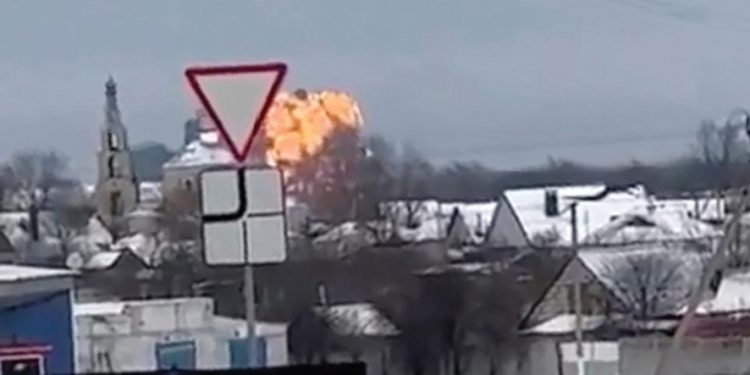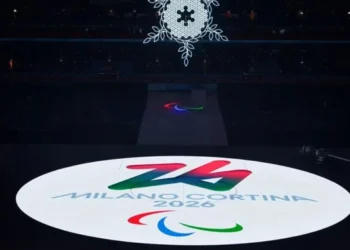A Russian military transport plane crashed Wednesday in a border region near Ukraine, and Moscow accuses Kyiv of shooting it down, saying all 74 people aboard were killed, including 65 Ukrainian prisoners of war headed for a swap. Russia offered no evidence and Ukraine did not immediately confirm or deny it.
In a statement, the Russian Defense Ministry said the Il-76 transport plane was carrying 65 POWs, a crew of six, and three Russian servicemen. It said Russian radar registered the launch of two missiles from Ukraine’s Kharkiv region that borders Belgorod.
Video of the crash on social media from the Belgorod border region of Russia showed a plane falling from the sky in a snowy, rural area, and a massive ball of fire erupting where it apparently hit the ground.
Kyiv was initially silent as details of the plane crash emerged Wednesday morning. Later, Ukraine’s intelligence agency confirmed that a prisoner exchange had been scheduled but did not take place.
It said that it did not have “reliable and comprehensive information about who exactly was on board the plane nor how many.”
The “Ukrainian side was not informed about the need to ensure the safety of the airspace in the area of the city of Belgorod in a certain period of time, as was repeatedly done in the past,” the agency added.
Separately, Ukraine’s armed forces said in a statement they would continue to “control the airspace to destroy the terrorist threat” of strikes crossing the border from Belgorod into Ukraine’s Kharkiv region.
Russia says prisoner exchanges will continue even if it must “deal with the devil”
Russian prisoner exchanges will continue, a senior Russian official said Thursday, despite Wednesday’s plane crash that saw 65 Ukrainian prisoners of war killed, alongside nine Russians, prompting further tension and hostility between Moscow and Kyiv.
“We cannot abandon our guys,” Tass reported the head of the State Duma Defense Committee Andrei Kartapolov as saying when asked whether prisoner exchanges would continue following the incident.
“We will talk even with the devil, work even with the unclean, but we need to get our guys out. We have no other choice,” he said.
Prisoner exchanges are a thorny subject between Russia and Ukraine, although both sides have a vested interest in carrying out sporadic swaps of prisoners of war. Many prisoners remain in custody months after their initial capture.
Kremlin says it will agree to international investigation — if Kyiv admits plane attack was a crime
The Kremlin said it would agree to an international investigation into Wednesday’s plane crash in the Belgorod region that killed 65 Ukrainian prisoners of war if Ukraine admits to committing a crime in shooting the plane down.
Ukraine has not admitted responsibility for the crash, in which all on board died, and called for an international investigation into the incident, accusing Russia of “playing” with the lives of POWs.
Other key developments this week include:
At least 18 people were killed and more than 130 wounded in massive Russian airstrikes on Ukraine on Tuesday, Volodymyr Zelensky said. The air raids mostly targeted the two largest cities: The capital, Kyiv, and Kharkiv in the east. Ukraine’s president said more than 200 sites were struck, including 139 dwellings.
Russia’s military is carrying out probing attacks with barrages of missiles and drones in an attempt to find weaknesses in Ukraine’s defenses while US funding for security assistance is tied up in Congress, Celeste Wallander, a Pentagon assistant secretary of defense, has said.
The Hungarian prime minister, Viktor Orbán, said he had invited Sweden’s prime minister to visit and negotiate his country joining the NATO military alliance, a process that Hungary and Turkey have delayed. Turkey’s parliament, though, voted on Tuesday to accept Sweden as a NATO member.
Western allies aren’t supplying Ukraine with enough ammunition and air defense missiles, Ukraine’s foreign minister, Dmytro Kuleba, has said in an interview with German media. Russian attacks on Kyiv and Kharkiv on Tuesday “clearly show the need to provide more anti air defense systems, as well as more surface-to-air missiles”. As for the ground war, “insufficient quantities of artillery munitions has been a problem from the start,” he said.
Kuleba said he was still in talks with the German government about receiving Taurus cruise missiles, even after the lower house of the German parliament voted a week ago against delivering them. “We’ll never give up,” Kuleba said.
The finance minister of Germany has said it can’t keep up Ukraine’s defense capabilities on its own in the long term and that others will need to increase bilateral contributions.
‘20 Days in Mariupol,’ Mstyslav Chernov’s chronicle of the besieged Ukrainian city and the international journalists who remained there after Russia invaded, has been nominated for best documentary at the Oscars.
Poland and the Baltic states are calling for import bans on Russian aluminum and liquefied natural gas (LNG) for the European Union’s 13th package of sanctions against Moscow over its Ukraine invasion, a Polish official has said.
Compiled by Ana Dumbadze














